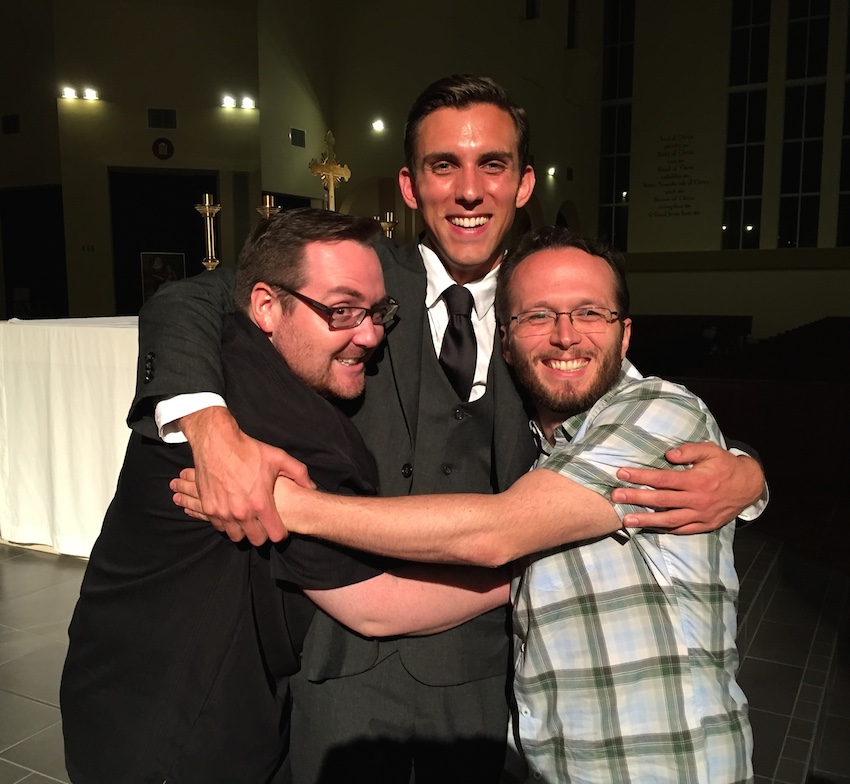Things to do in London

I will be going to London later this year. In preparation for that, I decided to compile a list of my favourite things to do in my home country’s capital city…

"We are travellers…not yet in our native land" – St. Augustine

I will be going to London later this year. In preparation for that, I decided to compile a list of my favourite things to do in my home country’s capital city…


 For my final month in San Diego, my Bible Study Group is going to be going through the epistles of St. John (1 John, 2 John, 3 John). However, this last week we reviewed our study of Ephesians. Here are the review questions the group came up with:
For my final month in San Diego, my Bible Study Group is going to be going through the epistles of St. John (1 John, 2 John, 3 John). However, this last week we reviewed our study of Ephesians. Here are the review questions the group came up with:
68. When was Ephesians written?
This letter is one of the “captivity epistles” and therefore was probably written during Paul’s Roman captivity in the early 60s.
69. What is significant about the destination of this epistle?
Mention of Ephesus in verse 1 is not found in the earliest manuscripts. It is therefore possible that this was a circular letter written to a number of congregations, one of which was Ephesus.
70. What was Paul’s relationship with Ephesian Church?
Christianity was present in Ephesus prior to Paul’s arrival. Paul used Ephesus as his base of operations for several years.
71. What does Paul write about in Ephesians?
Paul devotes most of the document to putting forth a vision of God’s redemptive work, brought about through Christ and manifested in the Church.
The Ephesians were mostly newly baptized Pagans and, because of this, some have referred to Ephesians as mystagogical catechesis.
Paul spends quite some time talking about “mystery”. This relates to Jesus’ sacrifice on the cross which draws man, both Jew and Gentile, back into relationship with God. This relationship is communicated through the Church, which has Christ as her head.
1-16 | 17-27 | 27-42 | 43-52 | 53-57 | 58-67 | 68-71 | 72-81
All Questions

 This is one of the many reasons I love Pope Francis. A while ago, back when the Pope was visiting Rio de Janiero, the public saw the pope wearing something around his right wrist.
This is one of the many reasons I love Pope Francis. A while ago, back when the Pope was visiting Rio de Janiero, the public saw the pope wearing something around his right wrist.
This series of beads is known as “chotki” or “komboskini”. It is a prayer rope, much like a rosary, whose invention is typically attributed to St. Pachomius in the fourth century and is still used today by eastern Christians, both Eastern Orthodox and Catholic.
One prays by the chotki by reciting “The Jesus Prayer” on each bead/knot:
“Lord Jesus, Son of God, have mercy on me, a sinner”
Although typically 100 beads, they can vary. There are also sometimes additional beads with invocations of Mary (“The Theotokos“).
One of the first things I noted reading Pope Francis’ bio upon being a elected Pope was that he had strong connections to Eastern Christianity. It’s great to see him exposing the West to more of what the East has to offer 🙂

 Today I wanted to talk about an apologetic strategy I use a lot: asking questions. You see, regardless of the topic, be it abortion, Christianity or Catholicism, there is always the temptation to spend most of your time telling someone what they should believe. People are rarely very receptive to being told. When I’m in that mode, it becomes very easy for me to become pompous and prideful. Questions help prevent this.
Today I wanted to talk about an apologetic strategy I use a lot: asking questions. You see, regardless of the topic, be it abortion, Christianity or Catholicism, there is always the temptation to spend most of your time telling someone what they should believe. People are rarely very receptive to being told. When I’m in that mode, it becomes very easy for me to become pompous and prideful. Questions help prevent this.
Rather than telling someone what they should believe, I find it is generally much more effective to ask the person what they believe and why. This communicates to the other person that you care what they think and you want to know more. Even though you are talking less, you have guiding control over the conversation through the questions that you ask. Not only that, but if you ask questions, it will probably encourage your friend to open up and ask you questions about what you believe. This allows you to follow the advise a wise priest once told me: “It’s best to start giving answers only once they’ve started asking you questions”
I would suggest that the goal is to ask questions which reveal the flaws in that person’s worldview. Once these are revealed, you can then present your own perspective, thereby giving you an opportunity to demonstrate the cohesiveness of your own world view.
“He who asks questions has control”
– Socrates (387 BC)
A while ago, Aggie Catholics put together a great list of questions to ask when you’re evangelizing…

A while ago we were studying Colossians in Bible study. In preparation for this I downloaded sermons and podcasts on this epistle of Paul to aid me in my study. One such MP3 I downloaded was a sermon series by a Protestant pastor in which he said something that rather shocked me.
During his presentation, he spoke for some time about the apostleship of St. Paul. He then spoke about the replacement of Judas following the Resurrection:
Then they returned to Jerusalem from the mount called Olivet… In those days Peter stood up…and said, “Brethren, the scripture had to be fulfilled…concerning Judas who was guide to those who arrested Jesus. For he was numbered among us, and was allotted his share in this ministry… So one of the men who have accompanied us…must become with us a witness to his resurrection.”
And they put forward two…and they cast lots for them, and the lot fell on Matthi′as; and he was enrolled with the eleven apostles. – Acts 1:12-26
What shocked me was that, after recounting these events from the Acts of the Apostles, the pastor said that the Apostles made a mistake! He claimed that it was not Matthias who should have been selected, but they should have waited until the conversion of Paul! Wait…what?!

I went to Vigil Mass last night and we were up late afterwards celebrating with the new members of the Church.

As a result, I didn’t get to Byzantine Liturgy this morning, which meant that I missed out on hearing St. John Chrysostom’s Pascal Homily. For those of you that don’t know, in the Byzantine Church, this Fourth Century homily is read by the priest at the Liturgy every Easter Day.
Since I didn’t get to hear it today, I decided to read it myself and put it up here for you all to enjoy. Christos anesti! Alithos anesti!
Pascal Homily (Download)

 Today we cover the last few verses of Philippians:
Today we cover the last few verses of Philippians:
Greet every saint in Christ Jesus. The brethren who are with me greet you. All the saints greet you, especially those of Caesar’s household.
The grace of the Lord Jesus Christ be with your spirit. – Philippians 4:21-23
Here are my final thoughts:
For an audio-only version of this video, please click here.